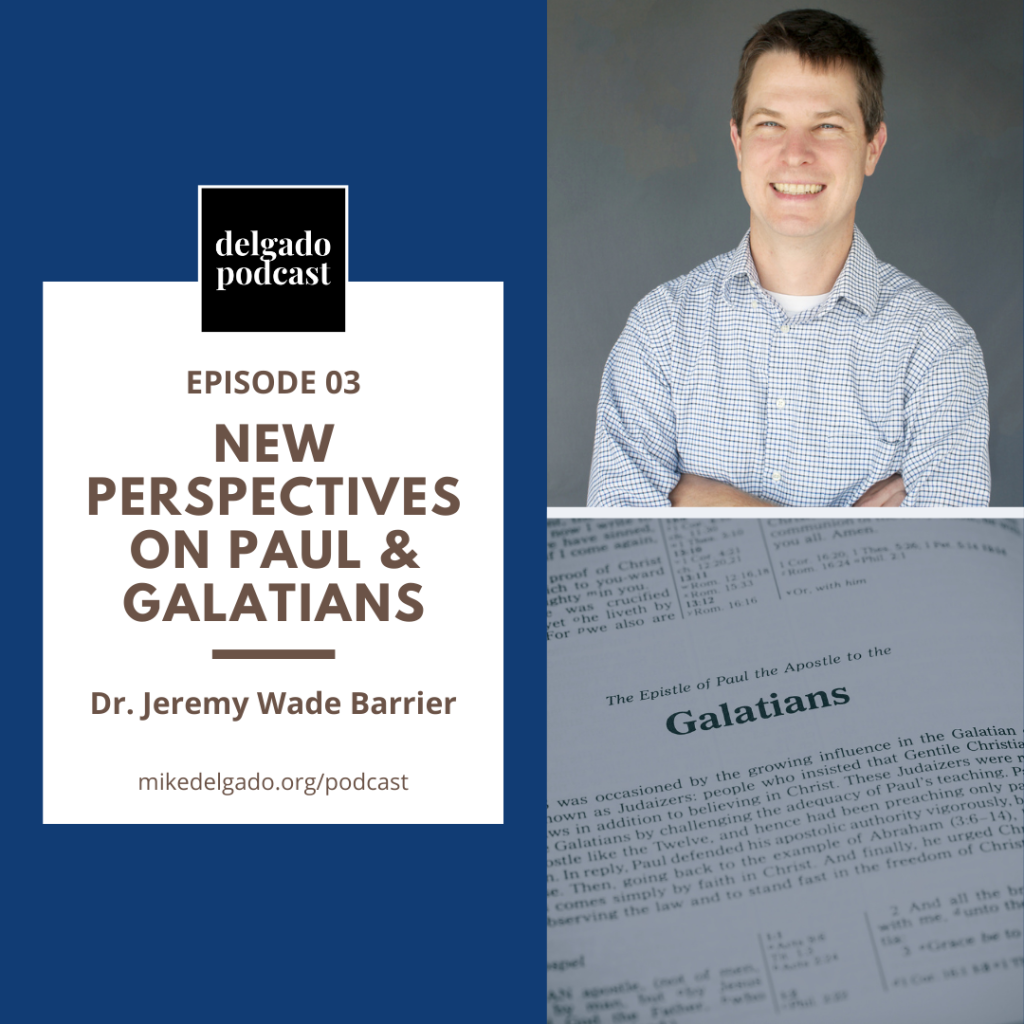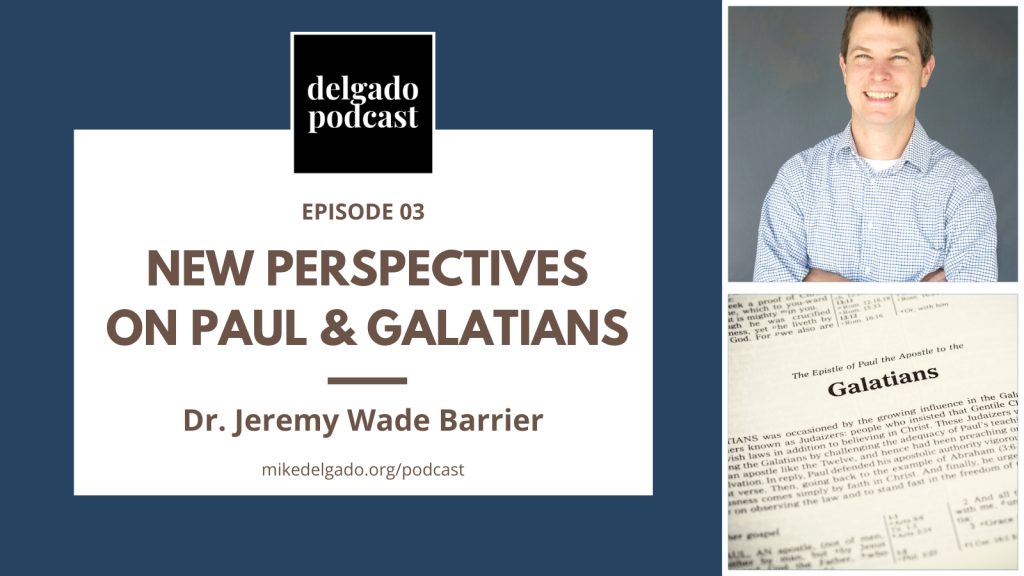 Honored to talk with Dr. Jeremy Wade Barrier about his twelve-year journey researching ancient manuscripts and writing his latest book “Witch Hunt in Galatia,” a book providing fascinating insights into ways to understand Paul’s letter to the Galatians.
Honored to talk with Dr. Jeremy Wade Barrier about his twelve-year journey researching ancient manuscripts and writing his latest book “Witch Hunt in Galatia,” a book providing fascinating insights into ways to understand Paul’s letter to the Galatians.
You can subscribe or download this episode on iTunes, Spotify, Google Podcasts or Stitcher. You can also watch or subscribe to the video series on YouTube.
Here’s a brief overview of the episode:
Part 1: New Perspectives on Paul
In part one, Dr. Barrier talks with us about his research studying “The Acts of Paul and Thecla,” which was an ancient text passed around in the early churches providing insight into Paul’s travels with Thecla — a woman who preached the gospel and later martyred. It’s a fascinating story that shows the faith and preaching power of a woman in the early church, which many don’t know about. He also shares some of the insights into what motivated Paul to write his letter to the churches in Galatia — and why the letter is much more than just a letter to correct them on their use of the law.
Listen to part one:
Part 2: New Perspectives on the Letter to the Galatians
In part two, Dr. Barrier continues talking with us about why Paul may have thought the Galatians were under some sort of spell or curse — and how the letter could partly be a counter-curse to help the Galatians break free from thinking they could be righteous through being under the law — especially circumcision. It’s a riveting way to read Galatians — and brings new meaning to Paul’s words when he says “Foolish Galatians, who has bewitched you?”
Dr. Barrier also talks with us about how to study the Bible and shares advice on how to choose the commentaries, Biblical research tools and scholarship to assist us in our understanding. He also shares some ways he reads the Bible devotionally and how he handles some of the complicated passages in the Bible.
Listen to part two:
Some takeaways from these discussions:
- Being a critical reader is a key for reading the Bible in an objective way — and will help you ask more questions and can lead you to discover different interpretations from various academics and theologians.
- Biblical interpretation is a fascinating academic field that provides fresh insights into ancient Biblical texts, cultures and history. Keep aware of the latest scholarship to help you with your understanding of the Bible.
- Studying the Bible means you will encounter strange, mysterious and even some upsetting writings. Realize that these ancient texts were written for a specific culture and the writer had an agenda. Question what you read — and don’t feel like you need to agree with everything.
- The Book of Galatians isn’t one of Paul’s affectionate love letters to a church, it’s a bombshell. He’s upset because the Galatian churches started thinking that righteousness came from obeying the law (e.g. circumcision) instead of by faith. Paul may have thought they were under some sort of magical spell, and this letter could be a way to counter the curse.
- Studying the Bible takes time — and that’s a luxury that many of us don’t have. Dr. Barrier shared some helpful study tools and commentaries to help us navigate Biblical texts in a timely way. We’re not alone in our journey to study the Bible — and there are countless academic resources written to help us. And, remember, Dr. Barrier says to keep yourself open to the latest research on the Bible, which can provide us with added insight into the culture, wording and background on Biblical texts.
- Any critical reader of the Bible will mean that you’ll probably end up with more questions than answers — and that’s part of the beauty and mystery of the Bible. It’s a reason why the Bible has been passed down through the ages and discussed and debated by various religious traditions. Studying the Bible will draw you into this ancient dialogue and debate, which can be an exhilarating experience.
Video of part one of our conversation:
Video of part two of our conversation:
Here is more information about his latest book:
Witch Hunt in Galatia: Magic, Medicine & Ritual and the Occassion of Paul’s Letter to the Galatians
Approximately 2,000 years ago, some Jewish communities of Galatia in central Asia Minor believed they had fallen under a curse, argues Jeremy Wade Barrier. A fellow Jew named Paul wrote the letter we call Galatians to help them escape its effects. In the letter, Barrier argues, Paul called for the Jews in Galatia to stop practicing circumcision. The rite had fallen into disuse within many Jewish communities in the Roman Empire, but Barrier argues the Galatian Jews believed it was a talisman that would protect them from harm.
As a further precaution, they needed to deal with the person who had brought this evil to their community. A witch hunt was underway, and some had concluded that the witch was none other than Paul. Barrier provides a reconstruction of the original occasion of Paul’s letter to the Galatians and shows how Paul defended himself from accusations of witchcraft by countering that the ritual that would protect them from the “Evil Eye” was not circumcision, but rather baptism. Through the ritual of baptism, they could receive healing from a material, yet divine, “breath” of God. Barrier also reconstructs an earlier understanding of this pneuma that was lost to subsequent Christianity under the influence of Neoplatonism. Learn more: Witch Hunt in Galatia
Jeremy Wade Barrier
Dr. Jeremy Wade Barrier is the Assistant Professor of Biblical Literature at Heritage Christian University and also did postdoctoral work as a Alexander von Humboldt Research Fellow under Tobias Nicklas at the Universität Regensburg, Germany. His last book “The Acts of Paul and Thecla: A Critical Introduction and Commentary” was written in 2009. He earned his PhD in Biblical Interpretations at the Brite Divinity School at Texas Christian University.
Check out more episodes from the Delgado Podcast.
Share on Instagram:

Share on Twitter:

To keep up with this weekly podcast series featuring academics, educators and religious leaders from different traditions discussing ways to understand the Bible, you can subscribe on Instagram, Twitter or get videos of the interviews on YouTube. Reach out with any suggestions for authors to feature, topics to discuss and share your thoughts on an episode.

